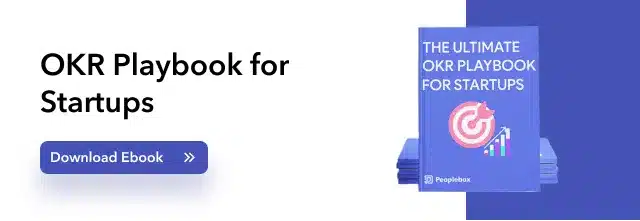There is always confusion when it comes to OKR vs Smart Goal because OKR is a goal setting framework so how they can be different.
“Goal” and “OKR” are often used together, but they have different concepts. There is a slight difference that makes OKR a successful goal-setting framework.
What is OKR?
OKR is a popular goal-setting framework that is used by famous organizations like Intel, Oracle, LinkedIn, Google, and Amazon. The OKR methodology is an extensive form of collaboration between teams that helps them to reach their goals through measurable results.
OBJECTIVE: I will successfully launch 3 versions of our main product
KEY RESULTS: Get over 10,000 new product sign-ups.
Here, the Objective needs to be very clear, concise and simple so that even a person that belongs to a cross-team department can understand your goal.
The golden rule is that every reasonable person whether from tech or non-tech can understand the motivation behind it.
Whereas, A Key Result is measurable and quantifiable; there is always a dilemma about whether achieved.
Experts recommend creating at least 3 KRS to start with, and you’ll need an OKR champion to help you execute your OKRs smoothly in your organization.
To know more about how OKR works, read the updated OKR Guide here.

OKR vs Smart Goal
A Goal and OKR can be similar but the OKR framework is a goal-setting method that comprises goals into it.
In other words, a goal is simply a farsighted vision that is later broken down into Objectives and Key Results.
As a natural extract, when people come up with goals they say something like, “I want to grow my business revenue to $1 million.“
OKR suggests splitting a generic goal into an aspirational one that provides motivation whenever you read it.
Here the objective asks: Where do you want to go? and Key results meanwhile help in: How will you know you’re getting there?
For example: Increase sales to 10 lakh
Here the increased sales is a ( your direction for your roadmap)— your aspirational goal & 10 lakh ( target based on metrics)
It’s really that simple when your goal is sub-divided into a goal-setting framework; it becomes way easier to track your goal at regular intervals.
Treat OKR like a medication 💊
Often goals you set sway by & forget over a counter the period. But weekly OKR check-ins remind you of your goal like a daily dose of medication.
OKR helps to critically overlook your goals and makes it a less congratulatory approach to goal setting.
OKR vs Smart Goal: Why is there a need for OKR if I already have my goal?

Without a plan, everything is like you running into a dark tunnel, with no idea where you’ll reach.
Converting goals into OKR is important to have :
Transparency across all department
When goals are aligned with the OKR framework it becomes easy for teams to take an overview of what other teams are working on and get an instant idea of the progress report.
Everyone in the team is aligned
Better alignment, and better transparency results in faster growth of the organization. The team tends to have a clear vision of their work when there is no confusion regarding tasks and top-level objectives.
Cross teams will never be clueless about your work
Work occurs in organizations across departments, resulting in a lot of interdependencies between various teams.
When a team leader approaches you with an urgent request, he/she ought to know what handful of tasks the other team is already doing.
By doing so, the teams can decide the priority of each task and get to work seamlessly without any delay.
Can add multiple key results
Generally, an OKR consists of 3 KRs for a start, but teams can add multiple key results attached with a common objective.
There can be a sub-objective of a common objective and more key results.
OKR with a hierarchy tree view helps to understand and gives a more visible, transparent and updated everyday progress that works better.
What is the OKR framework?
Goal setting framework: Basically a growth strategy that helps an organization climb the stairs of success.
If you’d like to learn more about the OKR framework and what addition they can make I would recommend you to read these OKR benefits for your organizations’ hypergrowth.

Why you should consider OKR framework?
Remedy for employee motivation
OKRs are the powerhouse of motivation for employees. In the beginning days, it is difficult to adopt the OKR culture, but once it’s in practice it influences a healthy competition between employees to perform better.
OKR motivates risk-taking someday, inhibits learning and inspires employees to keep the graph of performance high.
Direction for future work
When somebody asks you “Where do you see yourselves in the next 5 years”? Don’t be afraid of such questions and a strategic answer can be tactic and measurable if you are using OKR.
When you set OKRs you can define where will you stand in the next quarter/ month/week with the task you’ve performed
Track regular progress towards goals
OKRs enable measurement and tracking of key results and provide an analysation where you stand. Check-ins play an important role while tracking OKRs.
If checking is missed often you might not able to track how your OKRs are performing. You can design a weekly or once two-week check-in pattern to calculate the actual outcomes from those OKRs.
Culture of healthy competition
Stretched OKRs build a competitive & high-performance culture.
When there is no set of competition, the team works in a flat source of motivation, but when there is a motive or vision that inspires the team they tend to take up the challenges and work above and beyond.
Conclusion:
The establishment of goals is as important as rolling out those goals into a form of action. We advocate a goal-setting method that correctly identifies the broader objectives and carefully balances the goal and OKR in measurable terms.
So as in order to achieve a strong or adhere goal employees must perform OKRs in a systematic and organized manner.






